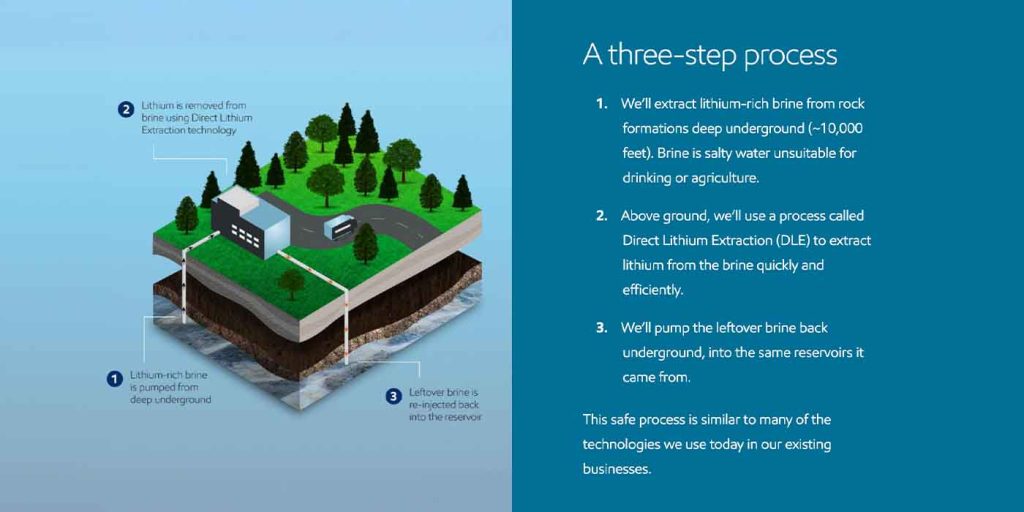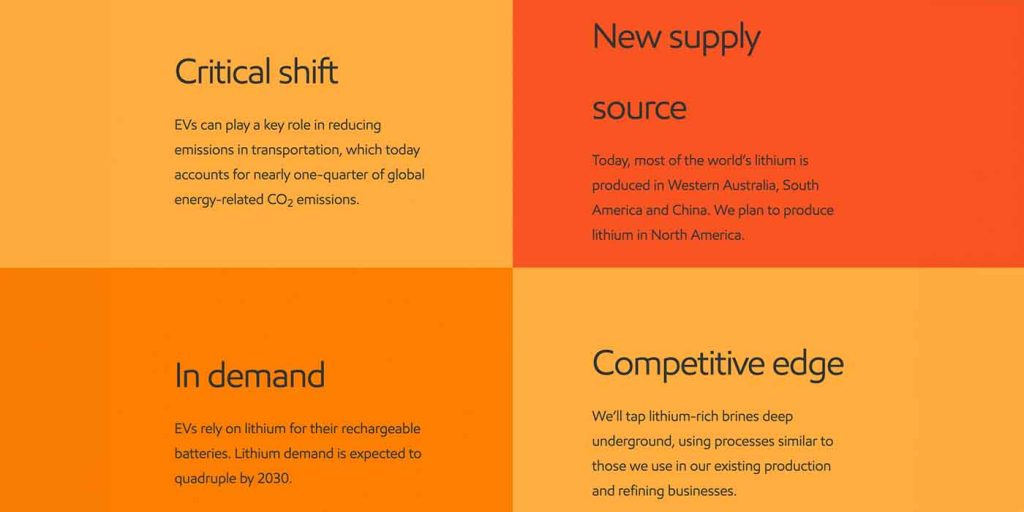
The evil empire of ExxonMobil is taking a slight reprieve from birthing oil barons to invest its time and money into a promising new venture – lithium. The carbon-clad gasoline company has begun drilling for a different earth material in the US, with an aim to become a leading supplier of lithium vital to current EV battery chemistry by the end of the decade. Do you think they’re using zero-emissions equipment yet?
ExxonMobil is the current multinational iteration of a gas company whose history dates back to John D. Rockefeller’s Standard Oil in the late 1800s. Ever since then, the company has been helping the world get around in combustion vehicles, much at the expense of Mother Earth and the future of humankind.
It pains us to even cover a company like ExxonMobil, as its history in environmentalism is as filthy as the oil it drums up. Despite being one of the top polluters in the US, the oil company has contributed mere peanuts to the research and development of cleaner and more sustainable fuel alternatives. There’s also evidence the company had clear knowledge of the effects of fossil fuels on global warming as early as the 1970s yet purposefully worked to paint a different narrative to the public.
It’s very tough to deny climate change these days (although a staggering amount of people still do), but automakers like Tesla have kicked the door in on a dinosaur of an industry (pun intended), showing the world that electric vehicles are not only viable modes of transportation, but they can also be cool as hell compared to traditional gas cars.
Nearly every legacy automaker today has vowed to inevitably expel combustion vehicle sales over the next decade or two, setting an expiry on new gas vehicles and a certain reduction in fossil fuel demand. As such, we’ve seen oil conglomerates like Shell begin venturing into EV charging infrastructure, looking to replace its current footprint of fuel pumps with EV charging piles.
ExxonMobil is taking a similar, yet different approach – using its know-how in oil drilling to begin sourcing lithium – a precious rare earth material vital to EV batteries – in the US. While this is welcomed news to an extent, it’s not difficult to see the motive behind ExxonMobil’s expansion into lithium and it sure as hell isn’t about saving the planet.
ExxonMobil looks to capitalize off huge lithium demand
The company announced it has officially begun the first phase of its North America lithium production project in southwest Arkansas, under a new sub-brand Mobil Lithium. ExxonMobil purchased the 120,000 gross acres of the Smackover formation in Arkansas earlier this year – an area considered to be one of the most largest lithium resources in North America.
By beginning to drill in precious lithium-rich brine reservoirs about 10,000 feet underground, ExxonMobil fancies itself as a leader in EV material supplies, or at least intends to become one by 2030. Per ExxonMobil’s president of low carbon solutions, Dan Ammann:
Lithium is essential to the energy transition, and ExxonMobil has a leading role to play in paving the way for electrification. This landmark project applies decades of ExxonMobil expertise to unlock vast supplies of North American lithium with far fewer environmental impacts than traditional mining operations.
This project is a win-win-win. It’s a perfect example of how ExxonMobil can enhance North American energy security, expand supplies of a critical industrial material, and enable the continued reduction of emissions associated with transportation, which is essential to meeting society’s net-zero goals.
As you can see from ExxonMobil’s graphic above, the company intends to use direct lithium extraction (DLE) technology to separate lithium from the saltwater using conventional oil and gas drilling methods rather than mining. According to the company, this produces fewer carbon emissions and requires less land. After the lithium is separated from the brine and converted on-site into EV battery-grade material, the remaining saltwater is then injected back into the earth.
Virtually all lithium extraction is currently taking place outside of North America, but ExxonMobil is not the only company vying for a piece of the rare earth pie. We’ve covered the Snow Lake Lithium reservoir developing in Canada, as well as California’s Lithium Valley project also in the works out west. We’ve also seen OEMs like GM invest in companies like EnergyX to tap into the lithium supply in North America in order to help limit supply chains and dependencies on other nations like China.
With phase one now underway, ExxonMobil expects to begin lithium production in 2027, while it simultaneously explores other opportunities to source EV-centric materials globally. By 2030, ExxonMobil says it hopes to be producing enough lithium to supply the builds of over one million EVs per year.
Electrek’s take
This news is noteworthy from an EV supply chain standpoint, as there is no denying the growing demand for lithium as EVs become more prevalent in the US and around the globe. Tapping into dormant material supplies on our home turf limits supply chains and can help drive down vehicle costs for consumers – especially since price remains a huge hurdle for wider EV adoption.
Please forgive me if I’m reluctant to give ExxonMobil a big pat on the back, as its intentions to source lithium are crystal clear. It’s all about the Benjamins, baby. ExxonMobil has the resources and drilling expertise to obtain North American lithium, so why not capitalize?
Not for the good of EVs or for less oil sales (you know the company is going to push that agenda until the well runs dry), but for pure profit. While we don’t necessarily condone the reasoning, it is refreshing to see a company with such a well-documented source of environmental tyranny pivot to a slightly less harmful process of drilling.
Don’t get it twisted, ExxonMobil is still the enemy, but seeing companies like it and Shell start venturing into other fuel alternatives and earth materials to support EV production should tell you that even they know the days of fossil fuels are numbered, even if it is a couple decades from now.
Author: Scooter Doll
Source: Electrek





